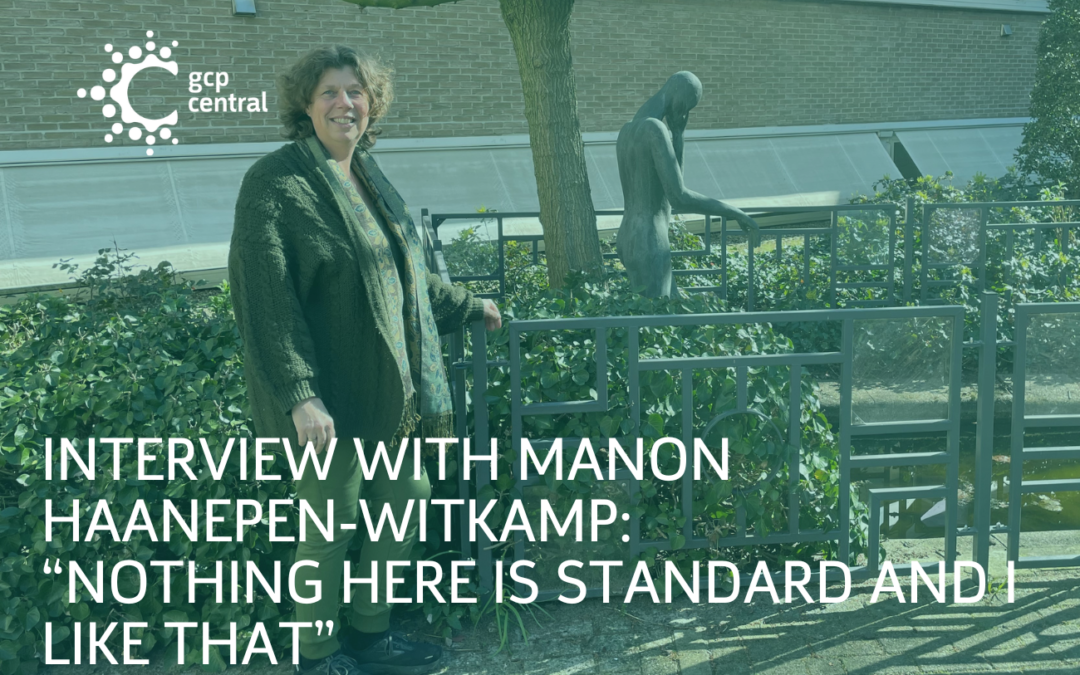GCP Central has now been around for more than 10 years, a time in which we have put all our energy, passion and dedication into training the international community of medical and scientific researchers on good clinical practice, or GCP. This is so that scientific research is conducted according to the applicable laws and regulations, for a smooth process from start to finish. And, of course, for the safety of participants and future patients.
We develop the courses for our clients, for you. We continuously show you what we are doing, what is changing and where we are going. But how do you experience our training? What is your motivation for doing research? How do you view the laws and regulations? Is there resistance? Is the training useful? Is the knowledge gained applicable?
In this interview series, we’re talking with you. That way, we can learn from your experiences, but someone else’s story may inspire you. We will visit different research groups, hospitals and people with varying roles within the world of science.
Manon Haanepen-Witkamp is the second researcher we’ll speak to in this series. She is the Research Coordinator at the Slingeland Hospital in Doetinchem. In over six years, she and the doctors have brought in many trials and conducted them in her hospital. She is ambitious and busy setting up a trial office, allowing her hospital to further professionalize research.
After studying Medical Biotechnology, Manon gained her first work experience within the pharmaceutical industry. For the last 15 years, she worked for Novartis, where she was declared redundant in 2015. Manon knows the hospital world by heart, but from now on she will get to know it intimately. Manon was hired as a DBC consultant at the Slingeland Hospital because she always wanted to learn and try something new. After a year, she knew the hospital inside and out and an internal vacancy came along, that of research nurse. Since Manon is not a nurse, she initially did not respond. But encouraged by one of the oncologists over the weekend, she reads through the vacancy anyway.
“And then I just thought: this is my job!”
Three weeks later, she is on the job, and her position is Research Coordinator. What helped her a lot at the time was that she already knew the hospital well. There was no one to onboard her; her predecessor had just left. There was a transfer, but no overlap. So, in that case, you have to figure everything out for yourself, which is precisely Manon’s strength. She derives great pleasure from the fact that “There is always something new, there is always something to figure out. Nothing is standard here and I like that then.”
A Research Coordinator was hired for the oncology/hematology department, and from day 1 she was secretary of the review committee. Partly consciously, but mostly unconsciously, she is drawing more and more attention to herself, so more and more departments are enlisting her help. In addition to the hematologists, oncologists and onco-surgeons, she works with the urologists, neurologists and pulmonologists. One of them said the other day, “We want you because you can streamline us. We have to see the patients and do everything, you make it run.”
Manon continues: “Then you do feel appreciated, and that’s nice. That makes you feel valuable in therole. And, by extension, it’s an extra for the hospital’s existence. The teaching hospitals need us as peripheral partners. Not everyone realizes that.” She doesn’t set up investigations herself, but if she has the right forms, she arranges for the investigations to run at the Slingeland Hospital. In fact, “at the hospital we are very quick to set up studies.”
She does not experience any resistance to laws and regulations; that is part of the job, and most of the preliminary work has already been done. Although, recently a study request came in from America. That took Manon a long time, just because of the number of forms with strange abbreviations that had to be looked up all the time. These things are fun and provide challenges. And now Manon thinks, “fine, we can do that now too, so next time we can have another study from America in no time.”
Manon is comfortable with the laws and regulations. Even for a request from America, she knows her way around these. So far, she has attended GCP training as part of the initiation visit of the studies she has worked on. But she always directs the doctors to GCP Central “because then they are completely up-to-date immediately, and that works fine.” Manon herself will soon be doing GCP Central’s WMO-GCP training.
And later when the trial office is officially up and running and everything is controlled centrally, she says, “Guys, we have to be with GCP Central.” Then you know you’re getting up-to-date training, which can be done through the learning platform, which is convenient. Now Manon is also working to gather a group of doctors who can go and do updated training in the fall. And that’s exactly what this Research Coordinator wants, to always make a professionalization effort, “so that we can do research in a streamlined way, and preferably also in all departments.”
So there are still some lines to be drawn for creating the trial office, despite Manon already working with so many people. In addition to the subject groups, she consults with lawyers when there are extraordinary things in the research contracts. Everyone at the lab and pharmacy also knows Manon by now. As secretary of the review committee, she has contact with the board of directors of the Slingeland Hospital. The cooperation with the Americans was pleasant, despite all the red tape and abbreviations. And when there are study visits from the academy or the pharmaceutical industry, Manon is there and “makes sure it is clear that we know what we are doing.” Manon is no stranger to the finance department, as she is busy making finances increasingly transparent. Research costs money, and in some cases, it generates some income, but the money flows are not always correct. Here she has to figure everything out by herself while working together. This is fun because:
“Don’t just give me standard stuff.”
In short, Manon is a spider in the web but mainly works alone and independently. This is a very fragile situation. Last year, she was out of circulation for a while due to personal circumstances. And then it became clear what many already knew. “That you are very vulnerable being on your own.” No one knew exactly what she was doing until she fell over because then all kinds of questions came up. At one point, she was still called home so often that she arranged for her own replacement. “I said, just call her, and it might work out.”
Fortunately, Manon is now back in full action and bursting with ambition and energy. Setting up the trial office now has her full attention, with the support of a new supervisor and the growing number of physicians leaning on Manon. To make the situation less fragile, she has now temporarily gained someone beside her, Elvira Fluitsma. Elvira is self-employed in clinical research and has had experience in the pharmaceutical industry since 2012. She also knows the ropes and what is involved in clinical research. With that, the “trial office in formation” may also have some time to showcase what they do. Getting some more exposure is on the list, just not at the top. “But the fact that we’ve included the first patient in a study worldwide is quite something. And then I want to do it well. All our energy goes into that, while we do not communicate it enough.” Another success is starting a study from America, for which one of the hematologists has now become National Coordinating Investigator. That is very special for the relatively small Slingeland hospital in Doetinchem. As soon as that study starts, that has to be brought out, just like she and about 16 colleagues here at the hospital will soon be following GCP Central’s WMO-GCP training. Manon would also like to publicize that, “because it is so important to be trained according to the latest criteria!”
Ambitious and driven. Meticulous and conscientious. Eager to learn and flexible. Research Coordinator Manon is in place; this indeed appears to be “her job”, and the stretch is far from over. In establishing the trial office, she is bound to find some bumps in her road, but knowing her, she is happy to take on those challenges. No beaten track for her, Manon thrives in a place where things are “not standard”.




